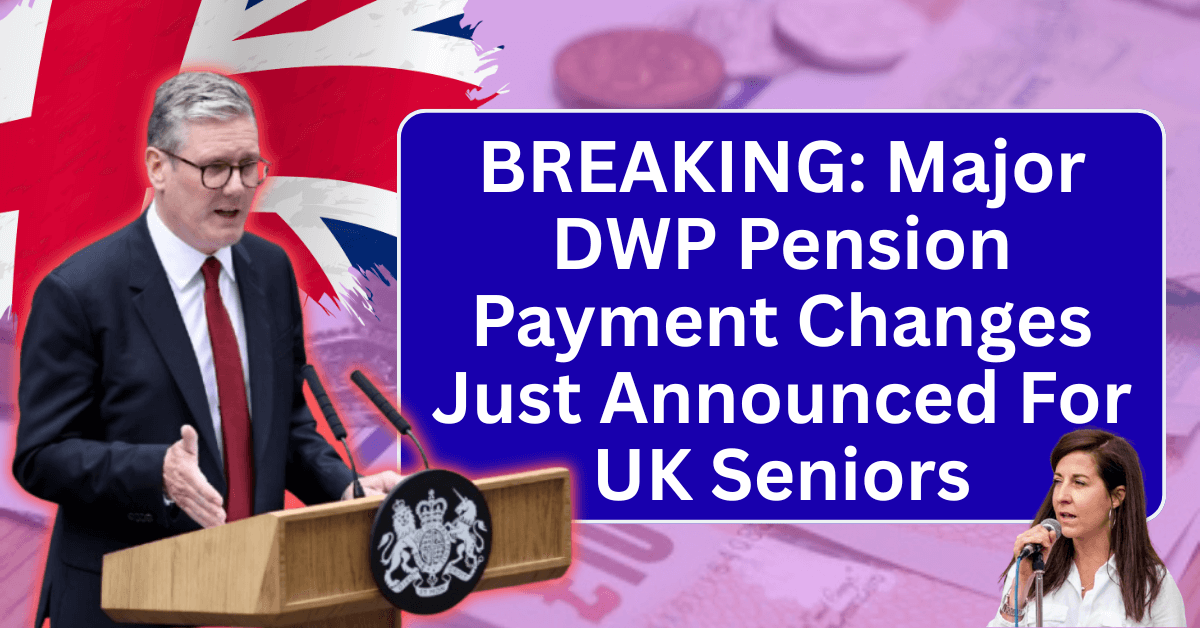The Department for Work and Pensions (DWP) has officially confirmed a fresh set of pension payment changes that will directly affect millions of UK seniors. With the cost of living still weighing heavily on retirees, these updates could bring both relief and confusion. Every pensioner, whether currently claiming or planning to, must understand how these changes impact their weekly and monthly income.
This article breaks down the new rules, who qualifies, the risks involved, and what steps seniors should take immediately.
What the DWP Just Announced
The DWP has confirmed adjustments to state pension payments, eligibility rules, and administrative processes. These changes aim to align with the government’s cost-of-living strategy, support vulnerable pensioners, and streamline payment systems.
For seniors, this means:
- Payment dates may shift for certain groups.
- Some pensioners will see changes in the amount they receive.
- Eligibility criteria linked to National Insurance (NI) records are under review.
- Extra support payments may be linked to pensions in 2025.
Why Pension Payments Are Changing Now
The government argues that changes are essential to keep the state pension system sustainable. With an ageing population, the cost of maintaining triple lock increases, and the need to balance public spending, the DWP has been under pressure to modernise the system.
Additionally, inflation and energy costs have forced ministers to reconsider pension support. For retirees living on fixed incomes, even a small delay or reduction can create financial strain.
Who Will See the Biggest Impact
The new rules won’t affect everyone equally. Some groups are more directly impacted than others.
- New State Pension claimants: Those reaching state pension age in 2025 will notice adjustments in their payment structure.
- Basic State Pension claimants: Older pensioners may see changes in how payments are scheduled.
- Seniors on Pension Credit: Linked benefits such as Pension Credit will also be adjusted alongside these changes.
- Part-time workers nearing retirement: Their National Insurance contribution record will play a major role in final pension calculations.
Payment Dates Could Be Shifted
One of the biggest updates is around payment scheduling. Some pensioners may see their state pension arrive on different days than they are used to, especially if their payments overlap with bank holidays or new DWP processing changes.
The DWP is warning that seniors must check their online accounts or letters carefully to ensure they are aware of the new cycle. Missing payments due to confusion is a risk, but the government has assured that no pensioner will permanently lose money.
Amount of Pension Payments in 2025
The DWP confirmed that pension amounts will remain linked to the triple lock – meaning pensions will rise by whichever is higher out of:
- Inflation
- Average wage growth
- 2.5% minimum increase
This could mean a rise of up to £900 per year for many pensioners in 2025. However, some seniors may see smaller increases if adjustments to National Insurance records or part-years are applied.
Pension Credit and Linked Benefits
Pension Credit will also be updated in line with the new pension system changes. For low-income retirees, this is essential, as Pension Credit opens the door to other benefits like:
- Free TV licence for over-75s
- Council tax discounts
- Cold Weather Payments
- Free NHS dental treatment
The DWP emphasised that pensioners eligible for Pension Credit must apply to avoid missing out. Shockingly, nearly 800,000 eligible pensioners are still not claiming what they’re entitled to.
How Bank Accounts Are Involved
One of the more surprising updates is linked to bank account rules. Pensioners may need to ensure their bank accounts are up to date and compliant with new DWP verification checks. Seniors who fail to update details risk payment delays.
This includes:
- Pensioners who recently changed their bank.
- Joint account holders needing confirmation.
- Those with overseas accounts where payments may be delayed.
Risk of Delayed Payments
The DWP warned that any errors in details—banking, NI records, or application forms—could result in temporary payment freezes. Seniors are advised to double-check their online pension accounts or contact DWP helplines if unsure.
Support for Seniors Struggling with Bills
The government confirmed that alongside pension payment changes, additional cost-of-living support packages will continue for the most vulnerable. This may include:
- Winter Fuel Payments (£300–£600)
- Warm Home Discount (£150 off energy bills)
- Cold Weather Payments (automatic payments during freezing spells)
What Pensioners Must Do Right Now
To avoid problems, pensioners are urged to:
- Check bank account details are correct.
- Review NI contribution records.
- Apply for Pension Credit if eligible.
- Keep an eye on official DWP letters.
- Sign up for online DWP alerts where possible.
Reactions From Pensioner Groups
Groups representing seniors have given mixed responses. Some welcome the confirmation of the triple lock, calling it “vital protection” during the cost-of-living crisis. Others warn that payment date shifts and bank verification rules could cause confusion and stress for vulnerable pensioners.
The Bigger Picture
These changes reflect a larger government strategy to modernise pensions. With more retirees depending on the state system, the DWP is under immense pressure to ensure it remains fair and affordable. However, balancing government budgets with pensioner needs is a difficult task, and some critics argue that pensioners are once again being asked to shoulder the burden.
Final Thoughts
For seniors, the message is clear: stay informed, stay prepared, and don’t ignore DWP letters. Missing out on payments or benefits due to confusion could cost hundreds of pounds each year.
The new pension payment rules could bring real financial relief for some, but also uncertainty for others. What matters most is that every retiree understands exactly how they are affected.
